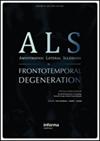Diagnostic and prognostic significance of neurofilament light chain NF-L, but not progranulin and S100B, in the course of amyotrophic lateral sclerosis: Data from the German MND-net
IF 2.8
4区 医学
Q2 CLINICAL NEUROLOGY
Amyotrophic Lateral Sclerosis and Frontotemporal Degeneration
Pub Date : 2017-01-02
DOI:10.1080/21678421.2016.1241279
引用次数: 59
Abstract
Abstract There is a need for diagnostic, prognostic, and monitoring blood biomarkers for ALS. We aimed to analyse and compare proposed candidate markers for disease progression in the course of ALS. Blood samples were taken from 125 ALS patients, including nine patients with C9orf72 or SOD1 mutation, at regular intervals of six months. ALS patients were characterized by the ALS functional rating scale (ALSFRS-R) and the Edinburgh Cognitive and Behavioural ALS Screen (ECAS). We quantified neurofilament light chain (NF-L), S100B, and progranulin (PGRN) and analysed it in relation to disease progression. Results showed that, at baseline, serum concentrations of NF-L but not PGRN or S100B discriminated significantly between ALS and controls. Within 24 months follow-up the marker concentrations remained stable. Baseline serum NF-L levels correlated with survival time, which was confirmed in subgroups with fast, intermediate, and slow disease progression and there was a weak association with disease duration. For S100B and PGRN we found an association with ALSFRS-R score changes and a trend for decreased levels in the fast progressor subgroup. In conclusion, serum NF-L in any ALS disease stage is a promising marker to support diagnosis and predict outcome, while serum PGRN and S100B are only of minor prognostic value.神经丝轻链NF-L在肌萎缩性侧索硬化症中的诊断和预后意义,而不是前颗粒蛋白和S100B:来自德国MND-net的数据
ALS需要诊断、预后和监测血液生物标志物。我们的目的是分析和比较ALS病程中疾病进展的候选标志物。125名ALS患者,包括9名患有C9orf72或SOD1突变的患者,每隔6个月定期采集血液样本。ALS患者的特征采用ALS功能评定量表(ALSFRS-R)和爱丁堡认知和行为ALS筛查(ECAS)。我们量化了神经丝轻链(NF-L)、S100B和颗粒前蛋白(PGRN),并分析了其与疾病进展的关系。结果显示,在基线时,血清NF-L浓度在ALS和对照组之间有显著差异,而PGRN或S100B浓度无显著差异。随访24个月,标志物浓度保持稳定。基线血清NF-L水平与生存时间相关,这在疾病进展快、中、慢的亚组中得到证实,并且与疾病持续时间存在弱相关性。对于S100B和PGRN,我们发现与ALSFRS-R评分变化相关,并且在快速进展亚组中有降低水平的趋势。综上所述,血清NF-L在任何ALS疾病阶段都是支持诊断和预测预后的有希望的标志物,而血清PGRN和S100B仅具有较小的预后价值。
本文章由计算机程序翻译,如有差异,请以英文原文为准。
求助全文
约1分钟内获得全文
求助全文
来源期刊

Amyotrophic Lateral Sclerosis and Frontotemporal Degeneration
CLINICAL NEUROLOGY-
CiteScore
5.40
自引率
10.70%
发文量
64
期刊介绍:
Amyotrophic Lateral Sclerosis and Frontotemporal Degeneration is an exciting new initiative. It represents a timely expansion of the journal Amyotrophic Lateral Sclerosis in response to the clinical, imaging pathological and genetic overlap between ALS and frontotemporal dementia. The expanded journal provides outstanding coverage of research in a wide range of issues related to motor neuron diseases, especially ALS (Lou Gehrig’s disease) and cognitive decline associated with frontotemporal degeneration. The journal also covers related disorders of the neuroaxis when relevant to these core conditions.
 求助内容:
求助内容: 应助结果提醒方式:
应助结果提醒方式:


